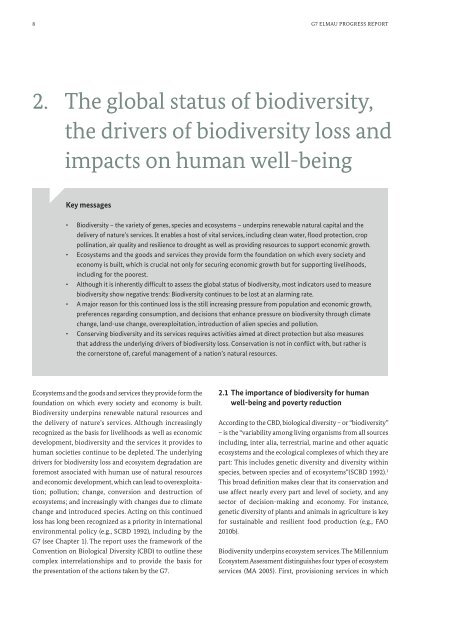G7-Elmau-Progress-Report-2015-Biodiversity-A-vital-foundation-for-sustainable-development
G7-Elmau-Progress-Report-2015-Biodiversity-A-vital-foundation-for-sustainable-development
G7-Elmau-Progress-Report-2015-Biodiversity-A-vital-foundation-for-sustainable-development
Create successful ePaper yourself
Turn your PDF publications into a flip-book with our unique Google optimized e-Paper software.
8 <strong>G7</strong> ELMAU PROGRESS REPORT2. The global status of biodiversity,the drivers of biodiversity loss andimpacts on human well-beingKey messages• <strong>Biodiversity</strong> – the variety of genes, species and ecosystems – underpins renewable natural capital and thedelivery of nature’s services. It enables a host of <strong>vital</strong> services, including clean water, flood protection, croppollination, air quality and resilience to drought as well as providing resources to support economic growth.• Ecosystems and the goods and services they provide <strong>for</strong>m the <strong>foundation</strong> on which every society andeconomy is built, which is crucial not only <strong>for</strong> securing economic growth but <strong>for</strong> supporting livelihoods,including <strong>for</strong> the poorest.• Although it is inherently difficult to assess the global status of biodiversity, most indicators used to measurebiodiversity show negative trends: <strong>Biodiversity</strong> continues to be lost at an alarming rate.• A major reason <strong>for</strong> this continued loss is the still increasing pressure from population and economic growth,preferences regarding consumption, and decisions that enhance pressure on biodiversity through climatechange, land-use change, overexploitation, introduction of alien species and pollution.• Conserving biodiversity and its services requires activities aimed at direct protection but also measuresthat address the underlying drivers of biodiversity loss. Conservation is not in conflict with, but rather isthe cornerstone of, careful management of a nation’s natural resources.Ecosystems and the goods and services they provide <strong>for</strong>m the<strong>foundation</strong> on which every society and economy is built.<strong>Biodiversity</strong> underpins renewable natural resources andthe delivery of nature’s services. Although increasinglyrecognized as the basis <strong>for</strong> livelihoods as well as economic<strong>development</strong>, biodiversity and the services it provides tohuman societies continue to be depleted. The underlyingdrivers <strong>for</strong> biodiversity loss and ecosystem degradation are<strong>for</strong>emost associated with human use of natural resourcesand economic <strong>development</strong>, which can lead to overexploitation;pollution; change, conversion and destruction ofecosystems; and increasingly with changes due to climatechange and introduced species. Acting on this continuedloss has long been recognized as a priority in internationalenvironmental policy (e.g., SCBD 1992), including by the<strong>G7</strong> (see Chapter 1). The report uses the framework of theConvention on Biological Diversity (CBD) to outline thesecomplex interrelationships and to provide the basis <strong>for</strong>the presentation of the actions taken by the <strong>G7</strong>.2.1 The importance of biodiversity <strong>for</strong> humanwell-being and poverty reductionAccording to the CBD, biological diversity – or “biodiversity”– is the “variability among living organisms from all sourcesincluding, inter alia, terrestrial, marine and other aquaticecosystems and the ecological complexes of which they arepart: This includes genetic diversity and diversity withinspecies, between species and of ecosystems”(SCBD 1992). 1This broad definition makes clear that its conservation anduse affect nearly every part and level of society, and anysector of decision-making and economy. For instance,genetic diversity of plants and animals in agriculture is key<strong>for</strong> <strong>sustainable</strong> and resilient food production (e.g., FAO2010b).<strong>Biodiversity</strong> underpins ecosystem services. The MillenniumEcosystem Assessment distinguishes four types of ecosystemservices (MA 2005). First, provisioning services in which


